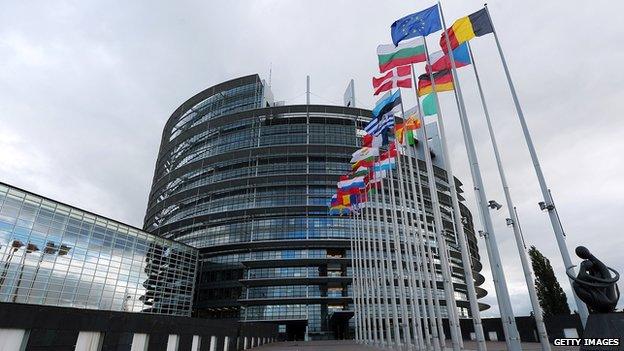Brussels too big and too bossy, Cameron tells EU leaders
- Published
David Cameron: "The EU cannot shrug off these results"
David Cameron has arrived for an EU summit, saying his message to other leaders was that "Brussels has got too big, too bossy, too interfering".
After the rise in votes for Eurosceptic parties, he said: "The European Union cannot just shrug off these results and carry on as before. We need change."
The summit comes as UK and EU political leaders react to the Euro elections.
Lib Dem Nick Clegg pledged to keep putting the pro-EU case. Tony Blair urged Labour to "stand up" to UKIP.
Labour leader Ed Miliband has set out his approach to rebuilding trust in politics in a speech in Essex.
Ed Miliband: "Closing ourselves off from the world...will harm working people"
Mr Miliband said UKIP had won votes by touting simple solutions to serious problems that had built up over generations.
"But there isn't a simple answer," he said.
There would need to be "big changes" in the British economy, he continued, to ensure that there were good jobs and affordable housing for young people.
A Labour government would seek to rebuild "solidarity and a sense of community", he said.
Mr Clegg, meanwhile, remains under pressure after his party lost all but one of its 12 MEPs.
More than 300 Lib Dem activists have signed an online petition advising Mr Clegg to resign although senior party figures, including Business Secretary Vince Cable, has said there is "no leadership issue".
Speaking during a visit to a youth centre in Westminster, the Lib Dem leader said he would not stand down and the party would not quit the coalition at a time the Lib Dems were being "vindicated" on the economy and other issues.
Nick Clegg: "It's right we stuck to our values"
He acknowledged his party had suffered a big setback in the European polls but said it had "stuck to its values" and was the only party putting the case for an internationalist UK in the EU.
Mr Clegg said he had long supported the principle of a referendum although his party opposes Conservatives' calls for one in 2017 and said it should only be triggered if further powers went from the UK to the EU.
"I personally would relish the opportunity to have this debate out in the country in a referendum," he said.
"The Lib Dems are not afraid, in any way, of a referendum. We have been advocating that for a long time."
He suggested the Conservatives' proposal was "an exercise in internal party management".
"We are in favour of reform. We are in favour of a referendum. But we are also in favour of saying unambiguously that we should be an internationalist country."
Seize initiative
Mr Cameron is in Brussels for an informal dinner with other EU leaders at which the election results will be discussed.
Following the elections, Mr Cameron has pushed the case for changes in the relationship between Brussels and EU member states in a series of phone calls to other heads of government.

UKIP will have 24 seats in the European Parliament
BBC political correspondent Iain Watson said Mr Cameron would attempt to seize the initiative following the Conservatives' first-ever third place in the European elections.
'Business as usual'
Supporters of Eurosceptic campaign group Business for Britain have written to the Daily Telegraph, external calling for Mr Cameron to spell out more clearly which powers should be taken back to Britain from Brussels.
The prime minister telephoned fellow EU leaders, including Germany's Angela Merkel, ahead of Tuesday evening's meeting in Brussels to emphasise that the results of the European elections, and the low turnout, have underlined the need for reform.
But speaking in Brussels, UKIP leader Nigel Farage said it felt like "business as usual".
Nigel Farage: "I just sat in a meeting where you wouldn't think that anything happened at all"
"We've just had a quite dramatic European election, with new sceptical parties, some new extreme nationalist parties, a massive spectrum, from the left to the centre to the right," he said.
"You know, there is a big dissident voice now in this parliament, and yet, I've just sat in a meeting where you wouldn't have thought anything had happened at all."
'Kowtowing'
Mr Blair suggested that UKIP's views on immigration were "regressive" and "under that facade there is something unpleasant and nasty".
Former Labour minister Alan Milburn said Mr Miliband and the other main party leaders needed to stop "kowtowing" to UKIP and "step up to the plate" and argue for the benefits of an open economy.
"This is the moment of test. They must really step up."
The European elections result is the first time a party other than the Conservatives or Labour has won a UK national election for 100 years.
UKIP won 27.5% of the vote and had 24 MEPs elected. Labour, on 25.4%, narrowly beat the Tories into third place while the Lib Dems came sixth behind the Greens. The SNP won two seats in Scotland.
Northern Ireland has yet to declare its results.
Far-right anti-EU parties, including the Front National in France, made gains across Europe as did anti-austerity groups from the left.